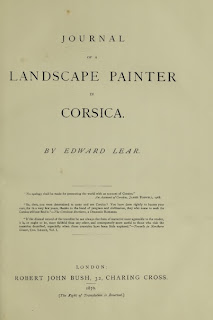 |
| Mr Lear in 1887 |
It is probably safe to say that most people will have
heard of Edward Lear, and even those that haven’t will almost certainly
recognise the opening lines of his most famous poem:
The Owl and the Pussycat went to sea,In a beautiful pea-green boat.
Lear is remembered today largely
as a nonsense poet, creator of the Jumblies, the Yonghy-Bonghy-Bo, the Pobble
Who Has No Toes, and numerous, humorous limericks (a form he helped to
popularise).
 |
| Two Limericks by Edward Lear |
His limericks seem a little forced to modern ears, as he repeated the
phrase of the first line as a variation in the last line, and often ran lines
together, giving a quatrain rather than the fives lines we are more used to.
And they are quite innocent, whereas our limericks are often very rude indeed.
But in his day, Lear’s limericks were extremely popular – John Ruskin placed
the Book of Nonsense first on his list of favourite books.
What is not as well remembered
these days are his works as a serious artist. Born in 1812, the twentieth of
twenty-one children, he experienced extreme poverty as a child, and was brought
up by an elder sister. Whilst still a teenager, Lear began work on his
illustrations of parrots, unusually for the time drawn from life, which were
published in an edition of 175, as Illustrations of the Family of the
Psittacidae, or Parrots in 1832, when Lear was still only twenty. The
forty-two hand-coloured lithographs are of breathtaking quality, and secured
Lear’s reputation as an ornithological illustrator, (a copy of the book, of
which about a hundred remain, sold in 2004 for over £50,000).
 |
| Ara Macao by Edward Lear 1830 |
Lear was a
life-long invalid, he suffered greatly from epilepsy, his ‘demon’ (of which he
was profoundly ashamed), bouts of depression, which he called ‘the Morbids’,
(worsened by his guilt about the epilepsy), bronchitis and asthma. He found the
air of the Mediterranean eased his condition, and travelled widely in the area,
drawing, painting and writing about his travels. For a brief period in 1846, he
was drawing master to Queen Victoria, but the English climate exacerbated his
fragile health and he returned to his beloved Italy, where he eventually
settled at San Remo.
His Journal of a Landscape Painter (variously in
Albania, Greece, Corsica and Calabria) are charming works, extremely
interesting and beautifully illustrated, and an utterly delightful read, but
for some strange reason largely ignored today. Lear’s sketches were often
worked up into oil landscapes, often with intense colour contrasts and stunning
atmospheric effects (with a hint of Holman Hunt), which he continued to exhibit
throughout his lifetime and which stand in stark contrast to the simplistic,
almost primitive, illustrations in the nonsense books. In his thirties his
eyesight began to fail and he dedicated himself to the landscapes (unable to cope
with the details of the biological illustrations), but at times he ground out
these ‘tyrants’ thirty at a time merely to provide an income.
 |
| Edward Lear - Sunset on the Nile above Aswan 1871 |
Lear was a
prolific letter writer – up to twenty a day – and wrote forty fat diaries, and
like all his writing they are delightful to read. He never married, but twice
proposed to the same woman, who refused him twice, maybe because she was 46
years his junior. After a period of failing health, he died in 1888, at San
Remo, and was buried there. In 1988 a memorial stone was flown from San Remo to
Westminster Abbey, where Lear took his place in Poets’ Corner, near to his
friend Tennyson and, with Lewis Carroll, the only other humourist to be so
honoured.
In 1988, a special set of stamps by the Royal Mail, and a commemorative
exhibition at The Royal Academy of Arts, which issued this special mug and
plate, marked the centenary of his death.
"How pleasant to know Mr.Lear!"Who has written such volumes of stuff!Some think him ill-tempered and queer,But a few think him pleasant enough.He reads, but he cannot speak, Spanish,He cannot abide ginger beer:Ere the days of his pilgrimage vanish,How pleasant to know Mr. Lear!






No comments:
Post a Comment